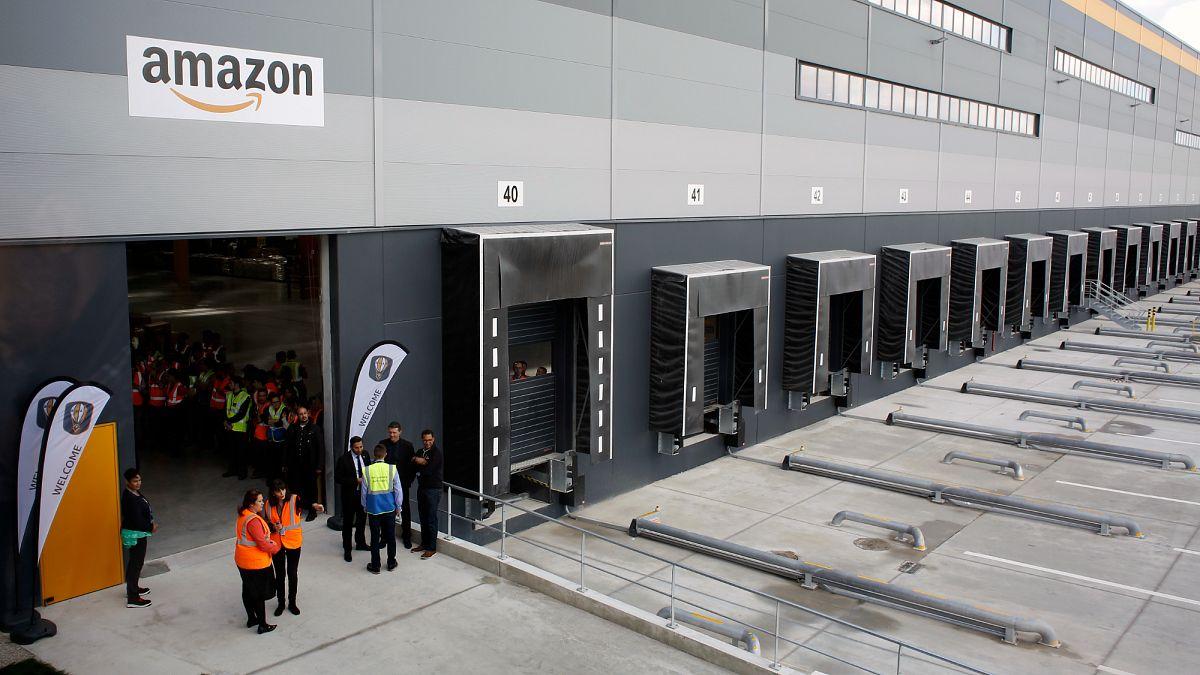AI Boom Drives 150% Surge in Big Tech's Indirect Emissions, UN Report Reveals
4 Sources
4 Sources
[1]
Tech giants' indirect emissions rose 150% in three years as AI expands, UN agency says
GENEVA, June 5 (Reuters) - Indirect carbon emissions from the operations of four of the leading AI-focused tech companies, Amazon (AMZN.O), opens new tab, Microsoft (MSFT.O), opens new tab, Alphabet (GOOGL.O), opens new tab and Meta (META.O), opens new tab, rose on average by 150% from 2020-2023, as they had to use more power for energy-demanding data centres, a United Nations report said on Thursday. The use of artificial intelligence is driving up global indirect emissions because of the vast amounts of energy required to power data centres, the report by the International Telecommunication Union (ITU), the U.N. agency for digital technologies, said. Indirect emissions include those generated by purchased electricity, steam, heating and cooling consumed by a company. Amazon's operational carbon emissions grew the most at 182% in 2023 compared to three years before, followed by Microsoft at 155%, Meta at 145% and Alphabet at 138%, according to the report. The ITU tracked the greenhouse gas emissions of 200 leading digital companies between 2020 and 2023. Meta, which owns Facebook and WhatsApp, pointed Reuters to its sustainability report that said it is working to reduce emissions, energy and water used to power its data centres. The other companies did not respond immediately to requests for comment. As investment in AI increases, carbon emissions from the top-emitting AI systems are predicted to reach up to 102.6 million tons of carbon dioxide equivalent (tCO2) per year, the report stated. The data centres that are needed for AI development could also put pressure on existing energy infrastructure. "The rapid growth of artificial intelligence is driving a sharp rise in global electricity demand, with electricity use by data centres increasing four times faster than the overall rise in electricity consumption," the report found. It also highlighted that although a growing number of digital companies had set emissions targets, those ambitions had not yet fully translated into actual reductions of emissions. Reporting by Olivia Le Poidevin; Editing by Aidan Lewis Our Standards: The Thomson Reuters Trust Principles., opens new tab Suggested Topics:Artificial IntelligenceSustainable MarketsGrid & InfrastructureClimate ChangeClean Energy
[2]
Big Tech emissions rose 150% in 3 years as AI booms, UN body says
The world's biggest tech companies saw their indirect carbon emissions grow by 150 per cent from 2020 to 2023 as AI use expands, a new UN report found. Four of the world's biggest artificial intelligence (AI) companies saw the indirect carbon emissions of their work grow by over 150 percent in the last three years, according to a report from a United Nations agency for digital technolgoies. The International Telecommunications Union (ITU) tracked the emissions, energy use, and climate commitments of 200 leading digital companies between 2020 and 2023 using public databases. The report found that Amazon, Microsoft, Google's parent company Alphabet, and Meta have seen a rise in emissions that is either produced or purchased by the companies because of "expanding data infrastructure and energy use". Indirect emissions are those that come from purchased electricity, heat, steam, or electricity use, like in data centres, telecommunication networks, or office buildings. Amazon saw the highest emissions increase at over 182 per cent in 2023 compared to 2020, followed by Microsoft at 155 per cent, Meta at 145 per cent, and Alphabet at 138 per cent, according to the report. The consumption of data centres, which power the AI models that these companies are working on, also rose 12 percent year over year from 2017 to 2023, which is four times faster than global energy growth. The report "underscores the urgent need to manage AI's environmental impact," the ITU said in a statement. Euronews Next reached out to the relevant technology companies regarding this report but did not receive an immediate reply. The report also found that half the assessed companies in their report had committed to reaching net-zero by at least 2050 if not earlier. Despite these actions, the report found that overall emissions still rose meaning that net-zero targets "have not yet translated into real-world reductions".
[3]
Big Tech's indirect emissions jumped 150% in 3 years amid AI boom, U.N. report says
The use of artificial intelligence is driving up global indirect emissions because of the vast amounts of energy required to power data centers, the report by the International Telecommunication Union (ITU), the U.N. agency for digital technologies, said. Indirect emissions include those generated by purchased electricity, steam, heating, and cooling consumed by a company. Amazon's operational carbon emissions grew the most, at 182% in 2023, compared with three years before, followed by Microsoft at 155%, Meta at 145%, and Alphabet at 138%, according to the report.
[4]
Tech giants' indirect emissions rose 150% in three years as AI expands, UN agency says
GENEVA (Reuters) -Indirect carbon emissions from the operations of four of the leading AI-focused tech companies, Amazon, Microsoft, Alphabet and Meta, rose on average by 150% from 2020-2023, as they had to use more power for energy-demanding data centres, a United Nations report said on Thursday. The use of artificial intelligence is driving up global indirect emissions because of the vast amounts of energy required to power data centres, the report by the International Telecommunication Union (ITU), the U.N. agency for digital technologies, said. Indirect emissions include those generated by purchased electricity, steam, heating and cooling consumed by a company. Amazon's operational carbon emissions grew the most at 182% in 2023 compared to three years before, followed by Microsoft at 155%, Meta at 145% and Alphabet at 138%, according to the report. The ITU tracked the greenhouse gas emissions of 200 leading digital companies between 2020 and 2023. Meta, which owns Facebook and WhatsApp, pointed Reuters to its sustainability report that said it is working to reduce emissions, energy and water used to power its data centres. The other companies did not respond immediately to requests for comment. As investment in AI increases, carbon emissions from the top-emitting AI systems are predicted to reach up to 102.6 million tons of carbon dioxide equivalent (tCO2) per year, the report stated. The data centres that are needed for AI development could also put pressure on existing energy infrastructure. "The rapid growth of artificial intelligence is driving a sharp rise in global electricity demand, with electricity use by data centres increasing four times faster than the overall rise in electricity consumption," the report found. It also highlighted that although a growing number of digital companies had set emissions targets, those ambitions had not yet fully translated into actual reductions of emissions. (Reporting by Olivia Le Poidevin; Editing by Aidan Lewis)
Share
Share
Copy Link
A UN report highlights a significant increase in indirect carbon emissions from major tech companies due to AI-related energy consumption, raising concerns about the environmental impact of AI expansion.
AI Expansion Drives Surge in Tech Giants' Emissions
A recent report by the United Nations' International Telecommunication Union (ITU) has revealed a startling increase in indirect carbon emissions from major tech companies, primarily driven by the rapid expansion of artificial intelligence (AI) technologies. The study, which tracked emissions, energy use, and climate commitments of 200 leading digital companies between 2020 and 2023, found that indirect emissions from four AI-focused tech giants – Amazon, Microsoft, Alphabet, and Meta – rose by an average of 150% during this period
1
2
.Individual Company Emissions Growth
The report highlights significant variations in emissions growth among the companies:
- Amazon: 182% increase
- Microsoft: 155% increase
- Meta: 145% increase
- Alphabet: 138% increase
These indirect emissions primarily stem from purchased electricity, steam, heating, and cooling consumed by the companies, particularly for powering energy-intensive data centers crucial for AI operations
1
3
.
Source: Reuters
AI's Growing Energy Demand
The ITU report emphasizes that the use of artificial intelligence is driving up global indirect emissions due to the vast amounts of energy required to power data centers. As investment in AI increases, carbon emissions from top-emitting AI systems are predicted to reach up to 102.6 million tons of carbon dioxide equivalent (tCO2) per year
4
.The rapid growth of AI is also putting pressure on existing energy infrastructure. Data centers' electricity consumption is increasing four times faster than the overall rise in global electricity consumption, highlighting the significant impact of AI development on energy demand
1
4
.Related Stories
Environmental Concerns and Company Responses
The findings underscore the urgent need to manage AI's environmental impact. While many digital companies have set emissions targets, with half of the assessed companies committing to reaching net-zero by at least 2050, these ambitions have not yet translated into actual reductions of emissions
2
.Meta, which owns Facebook and WhatsApp, has pointed to its sustainability report, stating that the company is working to reduce emissions, energy, and water used to power its data centers. However, the other companies mentioned in the report did not immediately respond to requests for comment
1
4
.Implications for the Future

Source: Euronews
As the AI industry continues to expand, the environmental impact of its energy consumption is becoming an increasingly pressing concern. The ITU report serves as a wake-up call for the tech industry and policymakers alike, highlighting the need for more sustainable practices in AI development and implementation
2
3
.The findings also raise questions about the long-term sustainability of AI growth and its potential conflict with global efforts to combat climate change. As companies continue to invest heavily in AI technologies, balancing innovation with environmental responsibility will likely become a critical challenge for the tech industry in the coming years.
References
Summarized by
Navi
Related Stories
Recent Highlights
1
ByteDance Faces Hollywood Backlash After Seedance 2.0 Creates Unauthorized Celebrity Deepfakes
Technology

2
Microsoft AI chief predicts artificial intelligence will automate most white-collar jobs in 18 months
Business and Economy

3
Google reports state-sponsored hackers exploit Gemini AI across all stages of cyberattacks
Technology








